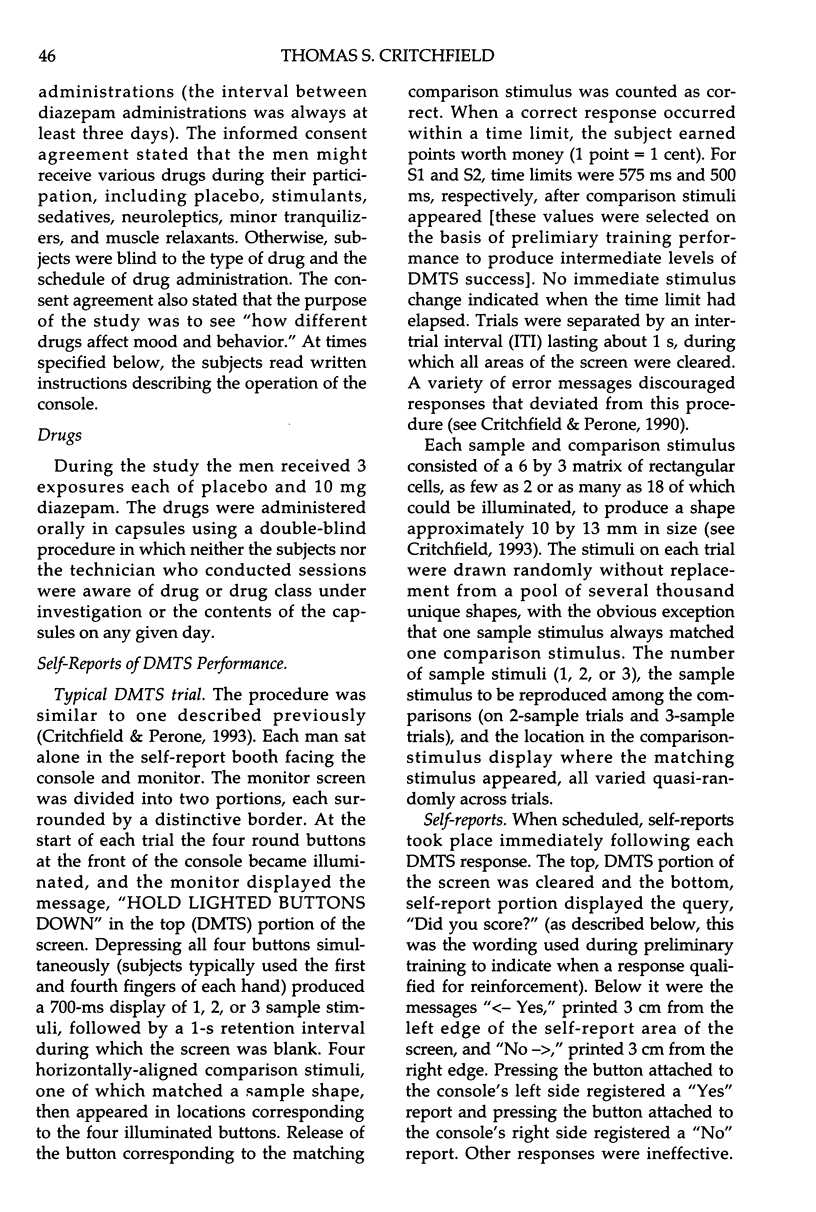Abstract
Diazepam (10 mg) was administered to two men performing a delayed matching-to-sample task in which the number of elements in a compound sample stimulus (one of which appeared among 4 comparison stimuli) was manipulated from 1 to 3. After each trial, subjects pressed either a “Yes” or “No” button in response to a computer-presented query about whether the last choice met a point contingency requiring selection of the matching comparison stimulus within a time limit. Diazepam simultaneously produced marginal decreases in matching-to-sample performance and more pronounced decreases in the accuracy of self-reports about the same performance. Diazepam selectively increased false reports of success; false reports of failure were not systematically affected. A signal-detection analysis summarized these patterns as a decrease in self-report discriminability (A') with no systematic change in bias (B'H). These preliminary results converge with those of clinical lore and the results of studies with other benzodiazepine drugs in suggesting that diazepam can produce an “overconfidence” in performance self-evaluation, the mechanisms and parameters of which remain to be identified. The results were inconsistent with those of one previous study of diazepam's effects on performance self-evaluation, but given procedural differences between the two studies, the discrepancy may reflect the functional independence of verbal operant classes in Skinner's (1957) taxonomy.
Full text
PDF











Selected References
These references are in PubMed. This may not be the complete list of references from this article.
- Branch M. N. Rate dependency, behavioral mechanisms, and behavioral pharmacology. J Exp Anal Behav. 1984 Nov;42(3):511–522. doi: 10.1901/jeab.1984.42-511. [DOI] [PMC free article] [PubMed] [Google Scholar]
- Critchfield T. S., Perone M. Verbal self-reports about matching to sample: effects of the number of elements in a compound sample stimulus. J Exp Anal Behav. 1993 Jan;59(1):193–214. doi: 10.1901/jeab.1993.59-193. [DOI] [PMC free article] [PubMed] [Google Scholar]
- Critchfield T. S., Perone M. Verbal self-reports of delayed matching to sample by humans. J Exp Anal Behav. 1990 May;53(3):321–344. doi: 10.1901/jeab.1990.53-321. [DOI] [PMC free article] [PubMed] [Google Scholar]
- Critchfield T. S. Signal-detection properties of verbal self-reports. J Exp Anal Behav. 1993 Nov;60(3):495–514. doi: 10.1901/jeab.1993.60-495. [DOI] [PMC free article] [PubMed] [Google Scholar]
- Evans S. M., Critchfield T. S., Griffiths R. R. Abuse liability assessment of anxiolytics/hypnotics: rationale and laboratory lore. Br J Addict. 1991 Dec;86(12):1625–1632. doi: 10.1111/j.1360-0443.1991.tb01757.x. [DOI] [PubMed] [Google Scholar]
- Evans S. M., Funderburk F. R., Griffiths R. R. Zolpidem and triazolam in humans: behavioral and subjective effects and abuse liability. J Pharmacol Exp Ther. 1990 Dec;255(3):1246–1255. [PubMed] [Google Scholar]
- Grier J. B. Nonparametric indexes for sensitivity and bias: computing formulas. Psychol Bull. 1971 Jun;75(6):424–429. doi: 10.1037/h0031246. [DOI] [PubMed] [Google Scholar]
- Griffiths R. R., Stitzer M., Corker K., Bigelow G., Liebson I. Drug-produced changes in human social behavior: facilitation by d-amphetamine. Pharmacol Biochem Behav. 1977 Oct;7(4):365–372. doi: 10.1016/0091-3057(77)90233-7. [DOI] [PubMed] [Google Scholar]
- Higgins S. T., Hughes J. R., Bickel W. K. Effects of d-amphetamine on choice of social versus monetary reinforcement: a discrete-trial test. Pharmacol Biochem Behav. 1989 Oct;34(2):297–301. doi: 10.1016/0091-3057(89)90315-8. [DOI] [PubMed] [Google Scholar]
- Higgins S. T., Stitzer M. L. Time allocation in a concurrent schedule of social interaction and monetary reinforcement: effects of d-amphetamine. Pharmacol Biochem Behav. 1988 Sep;31(1):227–231. doi: 10.1016/0091-3057(88)90338-3. [DOI] [PubMed] [Google Scholar]
- Lubin R. A. Influences of alcohol, interpersonal feedback, and drinking experience upon performance and judgment. Percept Mot Skills. 1979 Feb;48(1):95–104. doi: 10.2466/pms.1979.48.1.95. [DOI] [PubMed] [Google Scholar]
- Maylor E. A., Rabbitt P. M., Connolly S. A. Rate of processing and judgment of response speed: comparing the effects of alcohol and practice. Percept Psychophys. 1989 May;45(5):431–438. doi: 10.3758/bf03210717. [DOI] [PubMed] [Google Scholar]
- Morrow D., Leirer V., Yesavage J., Tinklenberg J. Alcohol, age, and piloting: judgement, mood, and actual performance. Int J Addict. 1991 Jun;26(6):669–683. doi: 10.3109/10826089109058912. [DOI] [PubMed] [Google Scholar]
- Roache J. D., Griffiths R. R. Comparison of triazolam and pentobarbital: performance impairment, subjective effects and abuse liability. J Pharmacol Exp Ther. 1985 Jul;234(1):120–133. [PubMed] [Google Scholar]
- Roache J. D., Griffiths R. R. Interactions of diazepam and caffeine: behavioral and subjective dose effects in humans. Pharmacol Biochem Behav. 1987 Apr;26(4):801–812. doi: 10.1016/0091-3057(87)90614-9. [DOI] [PubMed] [Google Scholar]
- Roache J. D., Griffiths R. R. Lorazepam and meprobamate dose effects in humans: behavioral effects and abuse liability. J Pharmacol Exp Ther. 1987 Dec;243(3):978–988. [PubMed] [Google Scholar]
- Roy-Byrne P. P., Uhde T. W., Holcomb H., Thompson K., King A. K., Weingartner H. Effects of diazepam on cognitive processes in normal subjects. Psychopharmacology (Berl) 1987;91(1):30–33. doi: 10.1007/BF00690922. [DOI] [PubMed] [Google Scholar]
- Stitzer M. L., Griffiths R. R., Liebson I. Effects of d-amphetamine on speaking in isolated humans. Pharmacol Biochem Behav. 1978 Jul;9(1):57–63. doi: 10.1016/0091-3057(78)90013-8. [DOI] [PubMed] [Google Scholar]
- Vogel-Sprott M. Self-evaluation of performance and the ability to discriminate blood alcohol concentrations. J Stud Alcohol. 1975 Jan;36(1):1–10. doi: 10.15288/jsa.1975.36.1. [DOI] [PubMed] [Google Scholar]


